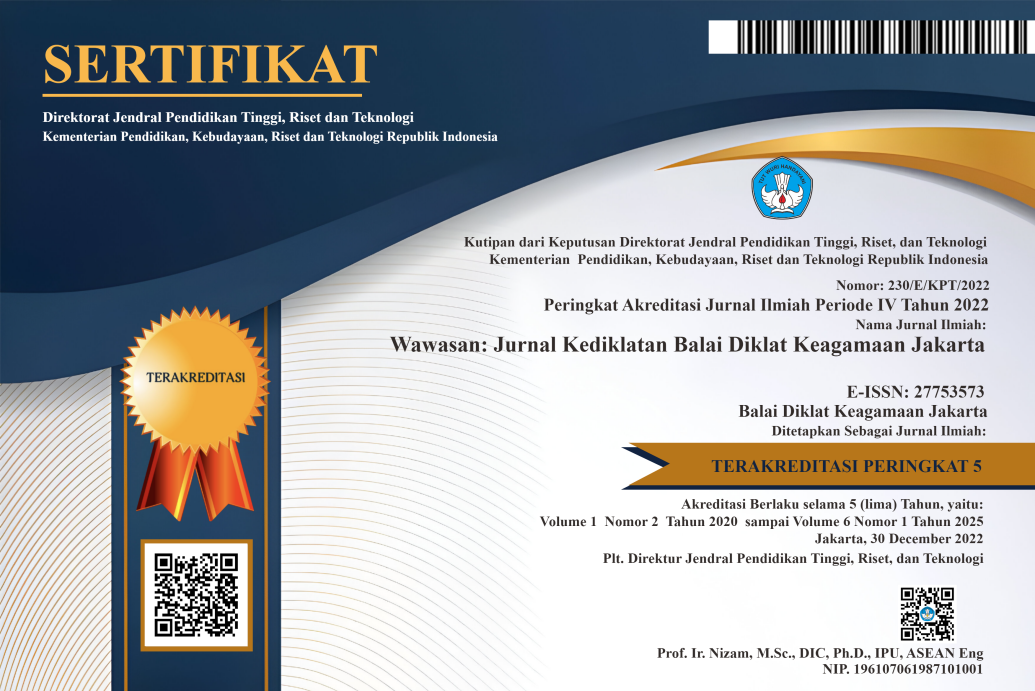BENEFITING MORE OF PROJECT WORK IN A LARGE CLASS
DOI:
https://doi.org/10.53800/wawasan.v1i1.51Keywords:
Project-Based Learning (PjBL), a large class, challenging and realistic tasks, structured and meaningful ProcessesAbstract
This study sets out to discuss the implementation of Project-Based Learning (PjBL) in a large EFL secondary school setting. It aims at finding an alternative of how to implement PjBL for the purpose of taking more benefits of project works and analyzing the relevance of the implementation of which within an EFL secondary school large class. 41 learners of grade XI participated in the classroom action research. They are assigned to work in groups with a set of meaningful processes to do in every project work given within a period of time. The study found that project works can be maximized on the grounds that: (1) projects should be based on realistic and challenging tasks; (2) project should be structured within a set of meaningful processes; (3) project works are to be conducted collaboratively in groups to facilitate learners to learn in a large class.
Downloads
References
Alan, B., & Stoller, F. L. (2005). Maximizing the Benefit of Project Work in Foreign Language Classroom. English Teaching Forum , 10-18. https://b-ok.cc/book/3109827/45dacf
Hayes, D. (1997). Helping Teachers to Cope with Large Classes. ELT Journal, Volume 51, Issue 2, 106-116. https://doi.org/10.1093/elt/51.2.106
Marzano., R.J, Pickering . D. J., & Pollock., J. E. (2001). Classroom Instruction that Works: Reasearch-based Strategies for Increasing Students' Achievement. In VA: Association for Supervision and Curriculum Development. Alexandria.
Teaching English. (n.d.). Retrieved April Saturday , 2016, from British Council Website: https://www.teachingenglish.org.uk/article/exposure
Wang, Q., & Zhang, N. (2011, April). Teaching Large Classes in China – English as a Foreign Language (Notes, April 2011). Beijing, China. https://warwick.ac.uk/fac/soc/al/research/groups/llta/resources/telc/5._wang_qiang_overview_of_china_research_0.pdf
Radianti, J., Majchrzak, T. A., Fromm, J., & Wohlgenannt, I. (2020). A systematic review of immersive virtual reality applications for higher education: Design elements, lessons learned, and research agenda. Computers & Education, 147, 103778.
Shim, T. E., & Lee, S. Y. (2020). College students’ experience of emergency remote teaching due to COVID-19. Children and youth services review, 119, 105578.
Jäggle, G., Merdan, M., Koppensteiner, G., Brein, C., Wallisch, B., Marakovits, P., ... & Vincze, M. (2019, April). Project-based learning focused on cross-generational challenges. In International Conference on Robotics in Education (RiE) (pp. 145-155). Springer, Cham.
Galanek, J. D., Gierdowski, D. C., & Brooks, D. C. (2018). ECAR study of undergraduate students and information technology (Vol. 12, p. 12). 2018.
Silalahi, T. F., & Hutauruk, A. F. (2020). The Application of Cooperative Learning Model during Online Learning in the Pandemic Period. Budapest International Research and Critics Institute-Journal (BIRCI-Journal), 3(3).
Downloads
Published
Issue
Section
License
Copyright (c) 2020 Wawasan

This work is licensed under a Creative Commons Attribution-NonCommercial-ShareAlike 4.0 International License.


















